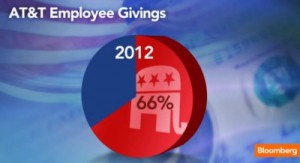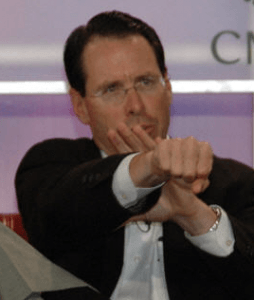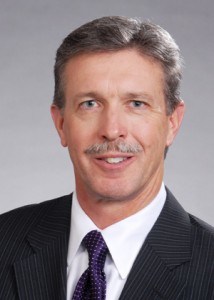Six weeks after AT&T’s colossal $39 billion dollar merger with T-Mobile USA fell apart, AT&T CEO Randall Stephenson opened his checkbook and donated $30,800 (the maximum allowed under federal law) to the Republican National Committee.
That contribution dwarfs Stephenson’s largest previous donation over the past twenty years: $5,000, according to the Center for Responsive Politics.
Bloomberg reports that Stephenson took a credibility and pay hit from the merger debacle, forcing AT&T to turn over $4 billion in deal penalties to its rival, T-Mobile, including precious wireless spectrum. The deal’s collapse personally cost Stephenson more than $2 million in bonus pay.
Although AT&T is not commenting, Wall Street analysts are, and they suspect Stephenson is sending the Obama Administration a clear message that he is upset with the decision to challenge the merger. The rest of AT&T appears to be following suit, with nearly two-thirds of political contributions, mostly from company executives, going to the Republican party which has traditionally maintained a much more friendly relationship with the communications giant.
 Several Republicans criticized the Justice Department and Federal Communications Commission for interfering with the merger deal which consumer advocates argued would reduce competition and raise prices for wireless services. Republicans have also expressed near-universal support for AT&T’s policy positions on Net Neutrality, community broadband, usage-based pricing, spectrum and price deregulation, removal of state oversight of telecommunications services, and marketplace consolidation.
Several Republicans criticized the Justice Department and Federal Communications Commission for interfering with the merger deal which consumer advocates argued would reduce competition and raise prices for wireless services. Republicans have also expressed near-universal support for AT&T’s policy positions on Net Neutrality, community broadband, usage-based pricing, spectrum and price deregulation, removal of state oversight of telecommunications services, and marketplace consolidation.
AT&T is a major sponsor of this summer’s Republican National Convention in Tampa, Fla. Several former lobbyists for AT&T are now working with the Romney campaign and its money bundling operations on behalf of the Republican presidential candidate.
The center reports no personal political contributions from the heads of either Verizon Wireless or Sprint.
Roger Entner, an analyst with Recon Analytics in Dedham, Massachusetts, notes AT&T was still trying to make nice with Obama Administration officials as late as last December, sending ornate cupcakes to various administration officials, including those at the FCC.
Entner noted it didn’t work.
[flv width=”640″ height=”380″]http://www.phillipdampier.com/video/Bloomberg ATT CEO Stephenson Maxes Contribution to GOP 5-29-12.flv[/flv]
Bloomberg News takes note AT&T CEO Randall Stephenson maxed out in contributions to the Republican Party just six weeks after the Obama Administration effectively nixed the $39 billion merger between AT&T and T-Mobile. (2 minutes)


 Subscribe
Subscribe






